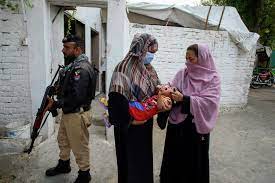
A bomb attack targeting a security convoy protecting a polio vaccination team in Pakistan has wounded nine people, reigniting concerns about the safety of healthcare workers and their protection forces. The attack took place during an anti-polio drive aimed at eradicating the disease in one of the last remaining countries where polio remains endemic.
Details of the Attack
The explosion occurred in the Khyber Pakhtunkhwa province, a region that has long been a hotspot for militant activities. According to local authorities, the bomb was detonated remotely, targeting a vehicle providing security to healthcare workers engaged in the vaccination drive. The convoy was traveling in the Bajaur district, a border area near Afghanistan, where the presence of militant groups remains a constant threat.
While no group has claimed responsibility for the attack, such incidents are often linked to extremist factions that oppose vaccination campaigns, viewing them as foreign interventions or even intelligence-gathering missions.
See Here:
Casualties and Response
Of the nine individuals wounded, most were security personnel assigned to guard the health workers. Medical teams quickly responded to the scene, transporting the injured to local hospitals. Several victims are reported to be in critical condition, raising concerns about further casualties.
Local law enforcement agencies have launched an investigation into the incident. Security operations have been intensified in the area, with authorities seeking to apprehend those responsible. The provincial government condemned the attack, reaffirming their commitment to continue the vaccination campaign despite the violence.
The Ongoing Battle Against Polio
Pakistan is one of only two countries in the world where polio remains endemic, alongside Afghanistan. Efforts to eliminate the virus have been hampered by widespread misinformation, particularly in rural areas where militant groups hold significant influence. These groups have often spread rumors that the polio vaccine is harmful or part of a Western conspiracy, fueling resistance to immunization campaigns.
Healthcare workers, particularly those involved in polio eradication, have frequently been the targets of attacks in Pakistan. Since 2012, dozens of polio workers and their security escorts have been killed, leading to international condemnation and concern over the future of the global eradication effort.
Security Risks to Healthcare Workers
The risks faced by healthcare workers in Pakistan, especially those involved in polio vaccination drives, remain high. Militants perceive the vaccination campaigns as threats to their influence, often labeling them as anti-Islamic or accusing workers of spying. This puts both the healthcare workers and the security personnel tasked with protecting them in constant danger.
Despite these challenges, the government and international health organizations have been committed to eradicating polio from Pakistan. Polio workers operate in dangerous conditions, often under heavy security, yet the recurring attacks make it difficult to reach every child with life-saving vaccines.
Global Implications
The recent attack highlights the broader challenges in global public health, where misinformation, political instability, and violence hinder progress. Pakistan’s struggle with polio continues to impact the global goal of eradicating the disease. Polio outbreaks in Pakistan pose risks not only to its population but also to neighboring countries, underscoring the need for international support and vigilance.
Government and International Response
Pakistan’s government has condemned the attack and vowed to continue its fight against polio. Prime Minister and health officials have reaffirmed their commitment to ensuring that the vaccination drives continue despite the dangers. International organizations, including the World Health Organization (WHO) and UNICEF, have also reiterated their support for Pakistan’s polio eradication efforts.
Efforts to improve public awareness and combat misinformation are also being ramped up in rural and remote areas. The government is focusing on building trust with local communities, emphasizing the importance of vaccination for their children’s health and future.
Conclusion
The bombing of a vehicle guarding an anti-polio drive in Pakistan is a tragic reminder of the ongoing risks faced by healthcare workers in regions plagued by extremism. As the country battles to eliminate polio, it must also confront the persistent threat of violence that undermines these critical health initiatives. Both national and international efforts must continue to protect those on the frontlines of public health and to ensure that Pakistan achieves its goal of a polio-free future





